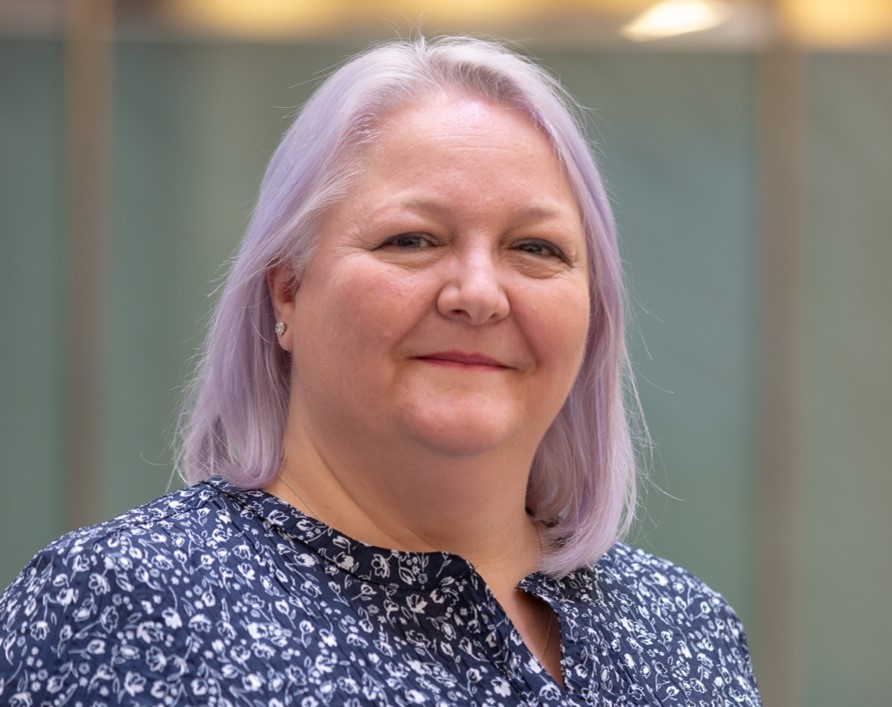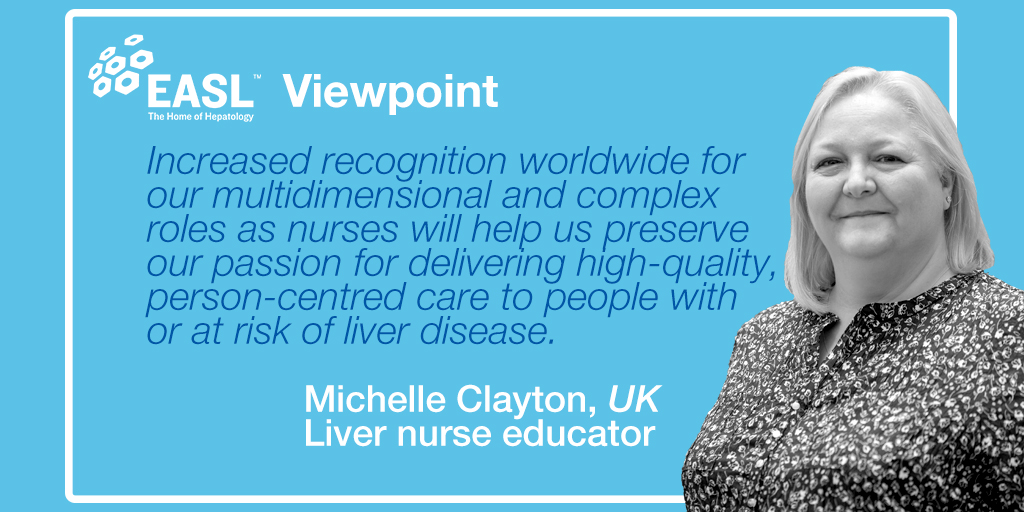
To honour International Nurses’ Day, we interviewed Liver Nurse Educator at the Leeds Liver Unit and Lecturer in Adult Nursing at the University of Leeds, Michelle Clayton. Additionally, Miss Clayton is a pioneer leader in hepatology nursing, and is the chair of EASL’s Nurses and Allied Health Professionals Task Force.
12/05/20
The World Health Organization designated 2020 as the Year of the Nurse and the Midwife in recognition of the contributions they make, and the risks associated with nursing shortages. Through 2020, nurses will be honoured worldwide. In addition, every year we celebrate International Nurses’ Day on 12 May, the anniversary of the birth of Florence Nightingale (1820-1910). She was a British nurse, social reformer, and statistician, and is known as the founder of modern nursing.
In this interview, Miss Clayton talks about the year of the nurse, the challenges liver nurses face during the COVID-19 pandemic, their qualities and skills, and offers a message for the future.
Read the full interview below
How is the COVID-19 pandemic affecting hepatology nurses generally?
We were looking forward to celebrating nursing in 2020, and in our case, liver nursing. We wanted to highlight the particular skills and qualities of hepatology nurses, and the dynamic and diverse roles we take on. It is important to inform people that nursing can be much more than bedside care, and we were delighted to have a year to dedicate to this. But the COVID-19 pandemic has forced us to reassess these plans, since the overriding priority for everybody has been simply surviving this virus and its aftermath.

That said, we are enthusiastic about celebrating the year of the nurse and quite rightly, we should. COVID-19 may have come to challenge us nurses, but it will not dampen our spirits nor our passion – for both our work as nurses and for advocating for our patients.
As liver nurses, how is your work affected currently?
The roles and working scenarios for nurses differ considerably, from one country to the next. Liver transplantation typically takes place at transplant centres in the UK or at centres of excellence in parts of Europe. In the UK, right now, our priority is saving the sickest people in these centres, those with limited survival time. The pandemic has caused the liver donor pool to decrease, because our ICUs (from where we might receive a donor liver), are full of COVID-19 patients. So at present, we have dramatically fewer donors than normal.
We have adjusted how we care for patients who are hospitalised. Because transplant recipient patients are immunosuppressed after their operation, we’re keeping them as safe as possible in isolated side-rooms. Meanwhile during COVID, the divisions of the hospitals have changed, creating new logistical challenges. In my hospital, we’re naming these divisions not only “hot” and “cold” (meaning with or without COVID-19 patients), but also “warm”: a third division created for patients who have been admitted, but with uncertain COVID-19 status.
Due to social distancing in the UK now, our liver and transplant patients are not allowed to receive any visitors. This differs from some other European countries, as reported by my Italian colleague.
Because patients have diminished access to the usual support of family and friends, we nurses need to be very agile and to advocate for our patients, in communicating with them and in helping them communicate with others (e.g. by helping set up digital support for those who need it).
Because liver disease affects people of all ages, patients have a wide range of digital literacy. Those who don’t or can’t use digital devices risk becoming extremely isolated. In some hospitals, tablet computers have been given to wards to use to help these patients connect with their loved ones.
How would you describe the qualities of hepatology nurses?
Nurses tend to work in a collegiate, cooperative fashion, which has been enhanced by the pandemic. We’re reflective, dynamic, and responsive. We adapt quickly, such as figuring out how to provide a service in a different way, while maintaining high standards.
At present, we need to give our patients more physical and psychological support than usual. Some support we provide from afar, to prevent patients from needing to come to hospital. So we’re being adaptable: improving our communication skills and becoming more innovative (such as figuring out ways for a patient to submit blood samples, without coming into the hospital).
What might be around the corner for liver nurses?
First of all, we’re learning from the new techniques we’re applying during the pandemic and we are going to embed them in practices going forward. Research on interaction between specialist nurses and patients shows value, and we’re looking forward to that being increasingly recognised and consolidated.
During the lockdown period, the sale of alcohol for domestic consumption has rocketed in the UK, and possibly elsewhere. People are responding in different ways, eating more and consuming more alcohol than usual, which is likely to trigger lifestyle-related health problems and metabolic-associated disease. We liver nurses will be handling a new wave of these patients, very soon.
It is crucial that we think ahead to life post-COVID, so our work can be as sustainable and steady as possible, once lockdown restrictions lift. We should not forget that we are liver nurses – and are passionate about caring for people with or at risk of liver conditions, which involves ongoing diagnostic and preventative care. It is important not to lose sight of the longer-term treatment needed, despite the immediate and urgent pressures.
In this Year of the Nurse, what can be done to enable nurses to work more effectively?
The recognition and responsibility accorded to nurses vary tremendously, from one country to the next. We would like increased recognition worldwide, for our roles as nurses and the multidimensional complexity within them. Recognition will help us preserve our passion for delivering high-quality, person-centred care to people with or at risk of liver disease.
There is much discussion about nursing and the emotional labour involved, which makes it even more important for nurses to step back, now and then, to inspire and support one other. With a spirit of unity, we can achieve so much for our patient groups and for one other.
Disclaimer: As the COVID-19 pandemic unfolds, treatment strategies are being developed and adjusted accordingly. EASL Viewpoints serve as snapshot interviews from the frontline and are intended to reflect the experiences at the time of the interview only.
